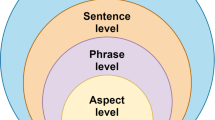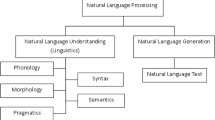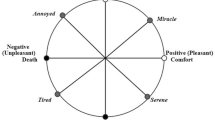Abstract
Negation handling is a crucial aspect of sentiment analysis, as it presents challenges to accurate sentiment classification by altering polarity and reducing reliability. Traditional lexicon-based approaches often lack adequate techniques for modeling negation and fail to identify the appropriate negation window. Moreover, building machine learning models for negation handling in conversational text data proves difficult due to the intricate syntactic structure of negation. To address these issues, we propose a novel unsupervised cognitive sentiment classification approach. Our research introduces the multi-criteria decision-making (MCDM)–based “Negation Handling of the Text Using the VIKOR Optimization Technique” (NEGVOT) model, which effectively handles negation in sentiment analysis. By employing the decision science method, the NEGVOT model provides a solution for correctly labeling text sentiment in both negation-free and negation-containing texts. Our approach utilizes a lexicon database to obtain context scores of textual comments and integrates emotional scores to achieve accurate sentiment classification. Through experiments conducted on three benchmarked datasets, we demonstrate that the NEGVOT model performs comparably to state-of-the-art models. The NEGVOT model achieves the accuracy of 83%, 85%, and 82% over three datasets. It significantly enhances the accuracy of sentiment orientation tagging by effectively handling sentences with negation. We employ statistical analysis to support the relevance of our findings. The NEGVOT paradigm ensures logical and consistent results while exhibiting a strong generalization capacity, enabling sentiment classification for texts containing negations. This study makes notable contributions to the advancement of unsupervised techniques and provides a robust framework for handling negation in sentiment classification tasks.













Similar content being viewed by others
Code Availability
The code generated during the current study are available from the corresponding author on reasonable request.
Notes
pip install negspacy.
References
Pandey S, Sagnika S, Mishra BSP. A technique to handle negation in sentiment analysis on movie reviews. Proc 2018 IEEE Int Conf Commun Signal Process ICCSP. 2018;737–43. https://doi.org/10.1109/ICCSP.2018.8524421.
Hupont I, Cerezo E, Ballano S, Baldassarri S. On the origin of the methodology for the scalable fusion of affective channels in a continuous emotional space and the ‘emotional kinematics’ filtering technique - a correction. Inf Fusion. 2021;67:1–2.
Valle-Cruz D, Fernandez-Cortez V, López-Chau A, Sandoval-Almazán R. Does Twitter affect stock market decisions? Financial sentiment analysis during pandemics: a comparative study of the H1N1 and the COVID-19 periods. Cogn Comput. 2022;14(1):372–87. https://doi.org/10.1007/S12559-021-09819-8/TABLES/17.
Popescu AM, Etzioni O. Extracting product features and opinions from reviews. Nat Lang Process Text Min. 2007;9–28. https://doi.org/10.1007/978-1-84628-754-1_2/COVER.
Na JC, Khoo C, Wu PHJ. Use of negation phrases in automatic sentiment classification of product reviews. Libr Collect Acquis Tech Serv. 2005;29(2):180–91. https://doi.org/10.1016/J.LCATS.2005.04.007.
Kumar V. Spatiotemporal sentiment variation analysis of geotagged COVID-19 tweets from India using a hybrid deep learning model. Sci Rep. 2022;12(1). https://doi.org/10.1038/s41598-022-05974-6.
Sigari S, Gandomi AH. Analyzing the past, improving the future: a multiscale opinion tracking model for optimizing business performance. Human Soc Sci Commun. 2022;9(1). https://doi.org/10.1057/s41599-022-01325-y.
Taboada M, Brooke J, Tofiloski M, Voll K, Stede M. Lexicon-based methods for sentiment analysis. Comput Linguist. 2011;37(2):267–307. https://doi.org/10.1162/COLI_A_00049.
Limsopatham N, Macdonald C, McCreadie R, Ounis I. Exploiting term dependence while handling negation in medical search. SIGIR’12 - Proc Int ACM SIGIR Conf Res Dev Inf Retr. 2012;1065–66. https://doi.org/10.1145/2348283.2348471.
Xia R, Xu F, Zong C, Li Q, Qi Y, Li T. Dual sentiment analysis: considering two sides of one review. IEEE Trans Knowl Data Eng. 2015;27(8):2120–33. https://doi.org/10.1109/TKDE.2015.2407371.
Xia R, Xu F, Yu J, Qi Y, Cambria E. Polarity shift detection, elimination and ensemble: A three-stage model for document-level sentiment analysis. Inf Process Manage. 2016;52(1):36–45. https://doi.org/10.1016/J.IPM.2015.04.003.
Ghag KV, Shah K. Negation handling for sentiment classification. Proc 2nd Int Conf Comput Commun Control Autom ICCUBEA. 2016. https://doi.org/10.1109/ICCUBEA.2016.7860016.
Amalia R, Bijaksana MA, Darmantoro D. Negation handling in sentiment classification using rule-based adapted from Indonesian language syntactic for Indonesian text in Twitter. J Phys Conf Seri. 2018;971(1). https://doi.org/10.1088/1742-6596/971/1/012039.
Ljajić A, Marovac U. Improving sentiment analysis for twitter data by handling negation rules in the Serbian language. Comput Sci Inf Syst. 2019;16(1):289–311. https://doi.org/10.2298/CSIS180122013L.
Gupta I, Joshi N. Feature-Based Twitter Sentiment Analysis with Improved Negation Handling. IEEE Trans Comput Soc Syst. 2021;8(4):917–27. https://doi.org/10.1109/TCSS.2021.3069413.
Mao R, Li X. Bridging towers of multi-task learning with a gating mechanism for aspect-based sentiment analysis and sequential metaphor identification. 35th AAAI Conf Artif Intell AAAI. 2021;15:13534–542. https://doi.org/10.1609/aaai.v35i15.17596.
Singh PK, Paul S. Deep learning approach for negation handling in sentiment analysis. IEEE Access. 2021;9:102579–92. https://doi.org/10.1109/ACCESS.2021.3095412.
Albatayneh NA, Ghauth KI, Chua FF. Discriminate2Rec: negation-based dynamic discriminative interest-based preference learning for semantics-aware content-based recommendation. Expert Syst Appl. 2022;199. https://doi.org/10.1016/j.eswa.2022.116988.
Lal U, Kamath P. Effective negation handling approach for sentiment classification using synsets in the WordNet lexical database. 2022 1st Int Conf Electr Electron Inf Commun Technol ICEEICT. 2022. https://doi.org/10.1109/ICEEICT53079.2022.9768641.
Mao R, Liu Q, He K, Li W, Cambria E. The Biases of pre-trained language models: an empirical study on prompt-based sentiment analysis and emotion detection. IEEE Trans Affect Comput. 2022. https://doi.org/10.1109/TAFFC.2022.3204972.
Zhang H, et al. Leveraging statistical information in fine-grained financial sentiment analysis. World Wide Web. 2022;25(2):513–31. https://doi.org/10.1007/S11280-021-00993-1/TABLES/5.
Ghadikolaei AS, Esbouei SK, Antuchevičienė J. Applying fuzzy MCDM for financial performance evaluation of Iranian companies. Technol Econ Dev Econ. 2014;20(2):274–91. https://doi.org/10.3846/20294913.2014.913274.
Esuli A, Sebastiani F. SENTIWORDNET: A publicly available lexical resource for opinion mining. Proc 5th Int Conf Lang Resour Eval LREC. 2006;417–22 [Online]. Available: http://nmis.isti.cnr.it/sebastiani/Publications/2007TR02.pdf. Accessed Sep 23, 2021.
Savanur SR, Sumathi R. SentiNeg: algorithm to process negations at sentence level in sentiment analysis. Int J Softw Innov. 2023;11(1). https://doi.org/10.4018/IJSI.315741.
Wang Z, Hu Z, Ho SB, Cambria E, Tan AH. MiMuSA—mimicking human language understanding for fine-grained multi-class sentiment analysis. Neural Comput Appl. 2023. https://doi.org/10.1007/s00521-023-08576-z.
Punetha N, Jain G. Sentiment Analysis of Stock Prices and News Headlines Using the MCDM Framework. 2023;1–4. https://doi.org/10.1109/aist55798.2022.10065221.
Punetha N, Jain G. Aspect and orientation-based sentiment analysis of customer feedback using mathematical optimization models. Knowl Inf Syst. 2023;1–30. https://doi.org/10.1007/s10115-023-01848-z.
Punetha N, Jain G. Game theory and MCDM-based unsupervised sentiment analysis of restaurant reviews. Appl Intell. 2023;1–22. https://doi.org/10.1007/s10489-023-04471-1.
Punetha N, Jain G. Unsupervised sentiment analysis of Hindi reviews using MCDM and game model optimization techniques. Sādhanā. 2023;48(4):1–13. https://doi.org/10.1007/S12046-023-02255-4.
Punetha N, Jain G. Bayesian game model based unsupervised sentiment analysis of product reviews. Expert Syst Appl. 2023;214: 119128. https://doi.org/10.1016/j.eswa.2022.119128.
Ghaleb AM, Kaid H, Alsamhan A, Mian SH, Hidri L. Assessment and comparison of various MCDM approaches in the selection of manufacturing process. Adv Mater Sci Eng. 2020;2020. https://doi.org/10.1155/2020/4039253.
Author information
Authors and Affiliations
Contributions
All authors contributed equally to this study.
Corresponding author
Ethics declarations
Consent to Participate
Not applicable.
Consent for Publication
Not applicable.
Conflict of Interest
The authors declare no competing interests.
Human and Animal Ethics
No humans or animals were harmed in any way.
Additional information
Publisher's Note
Springer Nature remains neutral with regard to jurisdictional claims in published maps and institutional affiliations.
Rights and permissions
Springer Nature or its licensor (e.g. a society or other partner) holds exclusive rights to this article under a publishing agreement with the author(s) or other rightsholder(s); author self-archiving of the accepted manuscript version of this article is solely governed by the terms of such publishing agreement and applicable law.
About this article
Cite this article
Punetha, N., Jain, G. Optimizing Sentiment Analysis: A Cognitive Approach with Negation Handling via Mathematical Modelling. Cogn Comput 16, 624–640 (2024). https://doi.org/10.1007/s12559-023-10227-3
Received:
Accepted:
Published:
Issue Date:
DOI: https://doi.org/10.1007/s12559-023-10227-3




